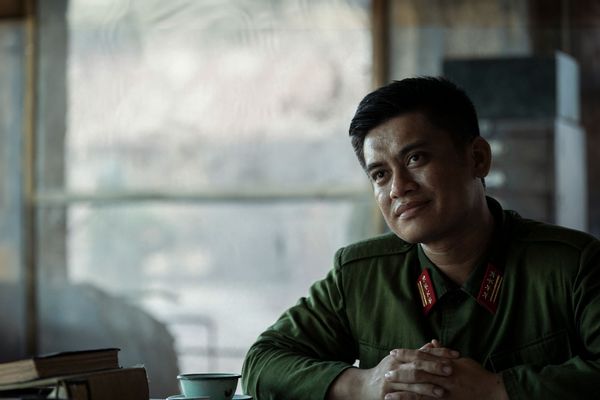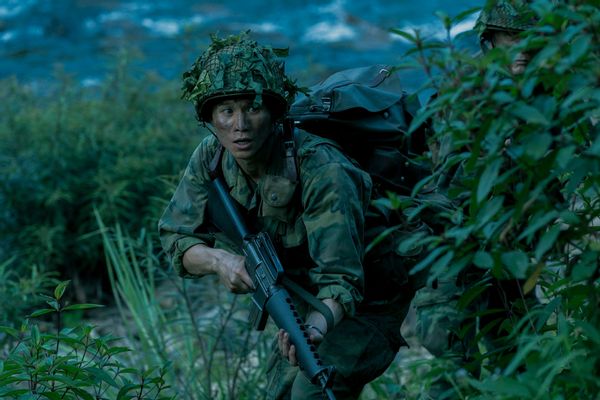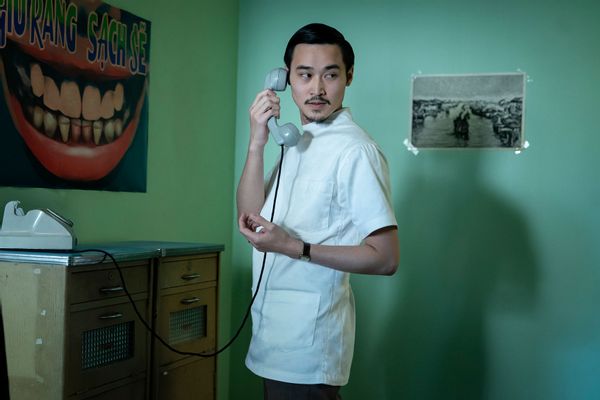
Endings are hard, aren’t they? This question doesn’t come up in my conversation with Don McKellar about the finale of “The Sympathizer.” But it is one he and his co-showrunner Park Chan-wook thought out carefully, striking a balance between accurately interpreting Viet Thanh Nguyen's 2016 Pulitzer Prize-winning novel and appropriately rendering certain turns for a visual medium.
The seventh and last episode of the limited series finds Hoa Xuande's man of two faces, The Captain, returning to Vietnam at last – not as a hero but as an infiltrator, marching across the Laotian border with a band of citizen troopers that includes his best friend Bon (Fred Nguyen Khan). It’s a doomed mission, backed by the CIA almost as a lark. The Captain’s CIA handler Claude (Robert Downey Jr.) knows it and tries to give him out, but he goes through with it anyway, trusting that his so-called heroism on behalf of the Communist regime will be rewarded.
We know that doesn’t happen from the first scene of the story, which rolls out afterward as a traipse through The Captain's memory. But in the finale, as his interrogator tells him, he’s done with the past tense.

The present is much harsher, although clarifying. Since “The Sympathizer” is told through the main character’s point of view we come to realize how much he’s left out, intentionally or otherwise. Torture unearths previously undisclosed memories, which The Captain endures out of loyalty to his and Bon’s other “blood brother” Man (Duy Nguyễn).
Somehow, and with no small amount of care, McKellar and Park bring us to the other side of The Captain’s trials without hollowing us out with too many painful scenes. As McKellar explained in a recent conversation conducted over Zoom, despite the plot and stylistic diverges the series adaptation takes from Nguyen’s book, “the metaphor of writing was always there at the beginning, this idea that we're writing our own story,” he said.
McKellar continues, “And that’s meant in both in a negative way because it is subjective, and it's unreliable because we don't have the bigger picture, but also in a more positive way . . . by saying, we have responsibility for our actions. And once we face that nothingness, we can begin to write our story in the story of our people.”
We also talked about McKellar and Park’s decisions to leave certain reveals for the end, discussed the reasons for leaving other horrors out of the picture, and landed on the meaning of “nothing” as this Vietnam post-war story presents the term.
The following interview has been edited for length and clarity.
You and Director Park changed a few plot details from the book – a common practice – but a significant one is leaving the reveal of who The Captain's father is to the very end. Can you talk a little bit about what informed that decision?
I mean, we say very early on, we say that he's multiracial and that his father was white and kids made fun of him. So we know something's going on there. The difference is that because it's a visual medium, we can reveal a face. Because we had Robert [Downey Jr.] playing multiple parts, this is another of The Captain’s psychological projections. Obviously, that's something you can't do in a book because we can't say, "There's something similar about all these characters." That's present in the book, the idea that there's a commonality amongst all these patriarchal characters. To leave one of the reveals for the end is to show that this is psychological too, that these characters are an unavoidable part of The Captain’s heritage, and they all are intertwined. At least in his head.
There’s also the reveal that Man is the Commissar, which restores The Captain’s relationship with him but also changes it. There's been so much that's been built up in the character's mind about Man. Much of what we see of him is in The Captain’s memory, his past tense, only to introduce him in the present as both the person who's protecting The Captain and Bon and torturing them to protect all of them.
Yeah. I mean, we always wondered, since audiences are so sophisticated these days, how quickly, how early will they guess the Commissar is Man. Certainly, we wanted to allow the audience to speculate what happened to him, and expect him to show up again.
And then we, we sort of moved the revelation up a little earlier than in the book and tried to make not quite as much of a late surprise. I feel like the audience knew he was going to come back but I'm curious to know how many people guessed it. But you say, he's important because he’s his redemption and also his tormentor. Like everything in the book, it’s a two-sided relationship.
In terms of your partnership with Director Park on this project, can you talk about the give-and-take in terms of each of your interpretations of “The Sympathizer”?
I mean, we always wanted to maintain the complexity of the book, to maintain the humor and the fun.
Early on, Chan-wook wanted to have multiple voices and multiple storytelling devices competing at some times because it is a plot about storytelling. We wanted to foreground all that and make that part of the fun. Especially for Episode 7, we didn't want it to get bogged down in the weight of the philosophy and history, because there's a lot to explain in terms of the mechanism of these reeducation camps that a lot of viewers won't know about.
I was very happy when Viet saw the finale. He said even though it still goes to the dark places, it still has that sort of fun and invention that he said he had when he was writing those chapters. He enjoyed it and he was glad that was maintained. The main thing I got from working with Chan-wook was the pleasure of always wanting the more fun idea, the cooler idea, the more resonant idea.

Yes, and one of his hugest departures was making Robert Downey Jr. play four characters – five by the end. How did you react to that proposal?
It came up because we were talking about how there was something similar in these recurring relationships The Captain has with these older father-like mentor characters — these patriarchal characters, as we call them. These soft older American and French characters who are both antagonists but also offer help and support to the Captain.
And that's when Chan-wook came up with this idea of a single character playing all those parts, like Peter Sellers in “Dr. Strangelove.” We loved the idea, first of all, because it was playful, and helped sell a tone and allow the audience to enjoy the genre aspects of the show. But also, it seemed to make this deeper point about how the patriarchy works and how his colonial history has many hands.
I’m going to guess that when people contemplate awards nomination reels, presenting Robert Downey Jr. playing all these characters will be the expected choice. But it strikes me that in the seventh episode, you really get to see Hoa’s versatility packed into one hour. He gets a workout. Much of that is due to your writing in these refrains that remind the audience of the cinematic torture in the Damianos film before subjecting The Captain to the real thing. How much were you mindful of setting up these visual cues throughout the season to bring them back in the finale?
One of the things we tried to do throughout the series is a lot is rhyming with thematic symbols. Torture keeps coming up again and again, and weird to think of torture as a literary device. It's beyond that. It’s a real part of this history and part of The Captain’s trauma.
But yeah, we wanted them to keep ringing in the captain's head until we saw the source of it, which shows the depth of his guilt with the communist spy. That is even tied into his own personal history with his mother and things like that.
You're right, that it comes down to The Captain in the end. And fortunately, Hoa really delivered. I mean, part of the idea is to say at the end, “We're in another world now,” which is very unusual for a finale. We've hinted at it, but we've never dug in deep with the captain. All those other characters are now in his head, and he's got to deal with himself. So if there's any question, they are supporting characters in his head by the end, and he is 100% the lead.
Returning to the choices that were made in the book that you interpreted differently onscreen, the choices that were made in terms of depicting the torture and The Captain’s state of mind were very effective on a few levels. There’s this confrontation of the way that his mind is protecting what really happened to the communist spy, relating it to the depicted assault of The General’s daughter in “The Hamlet.” In a different era, those scenes may have been more graphic. I'm glad they weren't, to be clear, because the implication lent more of a mournfulness to the whole passage both for the spy and for The Captain.
I'm glad you felt it was effective because that was one of the things we talked about right from the beginning. In the room, we talked about it endlessly, this idea of, “How we can save ourselves from being complete hypocrites by representing the torture and the rape as the Damianos character did?” Like when he says “You were all raped and you should be grateful” — you know, like that.
That's the way the Vietnamese are always depicted in Vietnam War films: as victims. But we're telling it from the Vietnamese side. We have to get beyond that depiction. So we had to talk about how to represent trauma, like how to represent remembering torture rather than just merely depicting it.
As you say, it could have been more graphic. It certainly is in the book. I don't feel we pulled back from that. Viet totally agrees with our strategy. If we just depicted it as it was in the book on the screen, it would have been gratuitous.

In the story, one of the main things Viet asks the reader to consider in the end is the whole idea of what the phrase “Nothing is more precious than freedom and independence” really means. What were you hoping viewers would& kind of conclude from that moment as it is shown in the series?
Again, this is in the book, and it's very important. To me, it's not about nihilism. Maybe Man is leaning that way after everything he's been through. To me, the Man character is kind of a reclamation of the Kurtz character in “Apocalypse Now,” which always had this sort of romantic, Victorian White Man's Burden kind of racism to it because of its history, because of its source in “The Heart of Darkness.” This good soldier lost in a savage land facing the weight of the White Man's Burden, that kind of thing.
From the Vietnamese side, Man’s gone mad too, but by seeing his idealism collapse. So there's a lesson he's trying to The Captain in a deluded way . . . He still has his humanity inside. He still thinks he's doing some good. And the lesson is worth learning.
It's not about, “It's all pointless.” It's more that once you face the nothingness, that’s the beginning of growth. You can start processing it. That's sort of a precondition of consciousness, and you can start moving forward from there. The Captain has been in denial, and so it's a forced existential crisis.
To me, it's hopeful, even though it's insane. But it does allow The Captain to get to a place at the end where he can move beyond his personal hang-ups and start thinking about his people and the bigger picture.
The finale closes the same as in the novel, which is that Bon and The Captain sail off into the darkness in a literal sense – into nothingness. What are you hoping the audience will take away from that conclusion?
I mean, yes, they’re sailing off into nothingness. But to me, there's still hope. It's a reconciliation with his people and the ghosts of his people.
I find it optimistic because I know from history that the Vietnamese people did persevere and they did survive, both in Vietnam and in the diaspora. I feel like The Captain will too, and Bon will too. There's something magnanimous about the way Bon forgives his friend without condition, or because he knows that what they've gone through forces people to say things and think things when they know better.
It's about getting beyond ideology, especially in the face of war. And when I think about wars in the world right now, it's about getting beyond “your” side. Once we get beyond the dualism that The Captain is mired in, we can start experiencing real empathy and real humanity.
All episodes of "The Sympathizer" are available to stream on Max.







